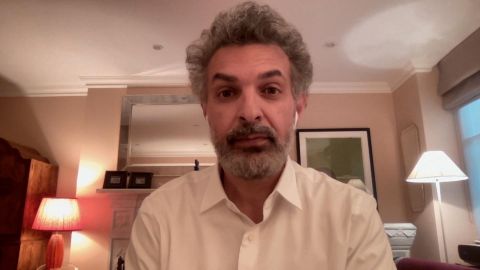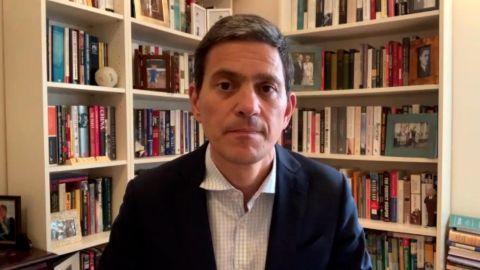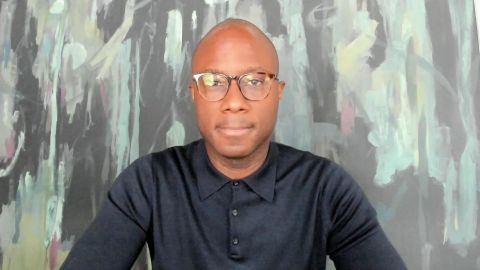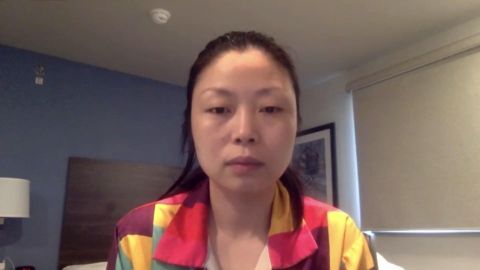Read Transcript EXPAND
CHRISTIANE AMANPOUR: And now, we turn to the pandemic with a look back at how it all began. So, how did the Chinese government manage to turn a cover up in Wuhan into a triumph for the communist party? That is the question acclaimed Chinese filmmaker, Nanfu Wang, tries to answer in her documentary, “In the Same Breath.” And here she is speaking to Hari Sreenivasan about it.
(BEGIN VIDEO CLIP)
HARI SREENIVASAN: Christiane, thanks. Nanfu Wang, thanks for joining us. Your film takes a look at how arguably the two most powerful nations on the planet dealt with this virus. Why intertwine these two?
NANFU WANG, DIRECTOR, “IN THE SAME BREATH”: Because I’ve seen the problems in both societies. And I am Chinese citizen. And I’m U.S. permanent resident. It is unfortunate, but I experienced the outbreak twice. Once in January, when I was in China and then again in March, when I was in the U.S. It was shocking and depressing for me to see the eerie and strange payroll in the two so-called politically and ideologically completely different societies making the same mistakes.
SREENIVASAN: You were able to marshal — you know, I don’t know how you did it, but you’ve got a bunch of talented videographers to get access into hospitals Wuhan. So, we see some of those first days and these really tragic stories. I mean, they are essentially watching people suffer and, in some cases, die. And there is a story in there, a character that emerges, a father who is on the 12th floor and his son is in much worse condition on a lower floor. Tell us a little bit about that.
WANG: It was captured by accident. When we start filming in the hospital, I quickly realized that both the camera people sometimes and definitely all the patients and the employees of the hospital would self-sensor. They would not want to film something that is remotely sensitive. And so, I told the camera people, don’t stop filming. Keep the camera rolling. That is my assignment. Even when you take a break, keep it filming. And then, this guy came and you see the entire conversation unfold. It was 20 minutes, his visit to his son. It was the last time he saw his son. He was infected because he was taking care of his son. And his son was dying. But he was been able to discharge from the hospital. But that was the last moment he will see him. It was heartbreaking because it was at the time when the government said that there is no human-to-human transmission. And his story was the evidence, to me, that he got infected from his son. And it was very early.
SREENIVASAN: According to the timeline of that family, the son got sick in November, which for most of the U.S., we don’t think of the start of the coronavirus that early. When you were talking about how difficult it is to get people to talk to you at least in the hospital, we have a clip of that. Let’s take a quick look.
(BEGIN VIDEO CLIP)
UNIDENTIFIED MALE: Can I talk to you for a minute?
UNIDENTIFIED FEMALE: Talk? Did the hospital let you in?
UNIDENTIFIED MALE: Of course. How else could I get in?
UNIDENTIFIED FEMALE: I’m afraid to talk.
UNIDENTIFIED FEMALE: We don’t have freedom of speech.
UNIDENTIFIED FEMALE: I’ll talk to you only if the hospital administration is here.
UNIDENTIFIED MALE: I was allowed in. You can trust me. I’ve been filming on the 5th floor for several days.
UNIDENTIFIED FEMALE: I don’t believe you. I can’t talk unless the head nurse is here.
UNIDENTIFIED MALE: Can you briefly introduce yourself?
UNIDENTIFIED FEMALE: Is the camera on?
UNIDENTIFIED MALE: Yes.
UNIDENTIFIED FEMALE: Turn it off. I’m an employee of the hospital. I don’t know what else to say.
UNIDENTIFIED MALE: You must have some feelings.
UNIDENTIFIED FEMALE: Yes. Complicated feelings.
UNIDENTIFIED MALE: About what?
UNIDENTIFIED FEMALE: Turn off the camera.
(END VIDEO CLIP)
SREENIVASAN: Why do you think they are so reluctant to speak to your camera person?
WANG: On January 1st there were eight doctors being punished for “spreading rumors” about a virus and that became national news. So, a lot of healthcare workers, they were warned by both their hospital and, you know, in China all the hospitals, the state-owned hospitals, except for private clinic, has a party branch in the hospital and that manages the entire hospital. So, they all have documents and, you know, already told every healthcare workers, doctors, nurses they couldn’t speak. And so, I wasn’t surprised that they would be afraid for speaking out.
SREENIVASAN: So, what happened to those doctors? I mean, in the United States we call them whistleblowers because they were trying to ring the alarm.
WANG: One of the most unknown among the eight doctors is Dr. Li Wenliang. He was punished on January 1st where he signed a document saying, I admitted that I made a mistake. It was a rumor. It was not real. And then, he passed away shortly in February, early February, from coronavirus, from COVID.
SREENIVASAN: You have footage in your documentary of a private clinic and it shows patients coming in one after the other over several days with the symptoms that we know now are related to the coronavirus. When you saw that footage what went through your mind? Because during this time, the Chinese government says it is not being passed from people to people.
WANG: I was astonished. I already knew how it happened because a clinic owner told me and she told me that among the patients they saw in December, several of them died of COVID. And including her husband too, who got infected from the patients that he saw. And it was in late December. But it was story that she told me. So, I wasn’t seeing it. So, when I finally got ahold of the surveillance footage in her clinic and I just reviewed quickly, I scrolled through day by day in Decembers, and the amount of people coming in some cases were with, you know, young girl saying that, I have pain in my chest. It’s been few days and I’m really nervous that I’m going to die. And the clinic owner said, don’t worry, don’t worry, you are so young you won’t die. And dismissed her. She left. And I kept wondering where are these people? What happened to them? And I’m seeing dozens of those people. What happened to them?
SREENIVASAN: One of the things that’s intriguing to me is the way that you found some of the subjects for this film is you went through social media where people are posting their names, their faces, their phone numbers, and even their x-rays. Why were they doing that?
WANG: So, that was what compelled me to start making this film. Is there was a forum, social media forum, the (INAUDIBLE) would be cry for help. COVID patients crying for help. And one night, when the forum first started, I noticed — because we were just monitoring everything on the internet. We knew it was going to be deleted right away. So, I noticed the forum and I saw just a very quickly there were hundreds and then soon thousands of people posting. And they were posting I.D., which is the most sensitive thing and medical records. All they wanted is to show, hey, I’m real and I’m stick. This is the proof that I’m real. This is my home address. This is my telephone number. This is my skin. This is my medical records. But I couldn’t get treatment. Please help me. And lot of them were hoping because they were standing in line at hospital. They’ve called every hotline they could. And they were hoping by putting all this information on the internet, it would attract attention, it would put pressure on the government, on the local government, state government to give them treatment. And that didn’t happen. So, I was afraid that this is going to be deleted next day. That night, I stayed up all night, archived 1,500 people. And we end up calling 500 of them over the next days and the weeks. And by the time, lot of people when we called — because the information was really detailed. Phone number, who is sick, how the person sick, when the symptoms started, what kind of effort they have made to get help and treatment. By the time we called, it’s like — first thing we always say is, we saw your post, how is your dad or how is your wife? And often times, the person responses that he already passed away.
SREENIVASAN: You have a montage of state television news anchors saying literally verbatim exactly the same script over and over again about how this virus is not something really to fear. And at the same time, you have got the state cleaning up social media instances of video. So, is it possible that the Chinese government did not know the extent to which coronavirus was rampant in the streets of Wuhan?
WANG: I don’t think there is a possibility that the Chinese government didn’t know. Because all this media in China is owned by the state. And the social media is managed by the government censures. And then in the film, you will see how early the government knew. And the fact that multiple dozens of reporters read the same report, the same news word by word, about eight people being punished for spreading rumor, it is a joke now, people among activists in China will say, if the government stands out and tell you, that is a rumor, most likely that is a truth because why would they try to tell you, don’t spread rumor. And if you look at the timeline, the news came from the central government. It is all across the local broadcast in China. It was not a local decision. And of course, all the local media is not — in China is managed by the state as well.
SREENIVASAN: While this is all happening, the Chinese government is having basically party conferences and not talking about the virus. They are essentially having the equivalent of super spreader events, right? But they aren’t talking about it. And why do you think that was?
WANG: I think as easy to think why the U.S. also, for a while, for weeks said nothing is wrong, everything is going away. They are having press conferences, meetings just as China is. It is sad. But what I think is both governments prioritized preserve its image of the government, of the leaders over the public interest of ordinary people, their safety and health.
SREENIVASAN: You have a young man who is grieving for his dad and he talks about how this experience has helped him understand the value of freedom of speech. And you juxtapose that in the film with the protests that were happening here in the United States. People outside of capitals, outside of places who did not want to wear masks.
(BEGIN VIDEO CLIP)
WANG (voiceover): As I watched the protesters in America, I thought about him. He said tens of thousands died in China because there was no freedom of speech. I wondered what he would think if he could see what was happening here.
UNIDENTIFIED MALE: I feel like the American government is trying to be more like China, which is a communist country. And I feel like being free is what separates us from other countries.
WANG (voiceover): Nine years ago, when I moved to the U.S., it was the idea of freedom that attracted me. I had never seen a protest until I came to the U.S. The closest thing to a protest I had ever seen in China was six people standing on the side of the road. And all of them ended up in prison. Nobody would look at these people and say that they are free. But is this what freedom looks like?
CROWD: USA. USA. USA.
UNIDENTIFIED FEMALE: (INAUDIBLE). You can’t tell me to leave.
UNIDENTIFIED FEMALE: You’re not wearing a mask.
UNIDENTIFIED MALE: Right here. I got my mask under my —
(END VIDEO CLIP)
SREENIVASAN: I’m also assuming that a footage like that made its way to Chinese state media. And I wonder what does your mom, what do your relatives think when they see those kinds of clips?
WANG: So, all these images of protest or chaos in the U.S. or, you know, the amount of death and COVID cases, it was reported endlessly in China. And all people what they saw is framed by the state media, by the government. So, my mom would watch the news and read the news about the U.S. with the context of what the reporter is framing it. So, my mom would call me and say, oh, wow, look at the U.S. and how horrible it is. Come back to China. China is much better. And China is more superior. Everybody would say, you know, it turns out that U.S. is not that powerful at all. It turns out that U.S.’s system didn’t work and it turns out our system is the best system. And that is what’s heartbreaking to me. Because I see how the situation has been taken advantage by the Chinese propaganda.
SREENIVASAN: You have footage here that I want to show in a clip of doctors and nurses lined up outside hospitals basically declaring victory over it.
(BEGIN VIDEO CLIP)
CROWD: We sing in praise of our beloved motherland, a propitious and strong nation.
WANG: I’ve seen ceremonies like this play out over and over after major disasters in China. People emerge from the trauma of these events with even stronger patriotic sentiment than before.
(END VIDEO CLIP)
SREENIVASAN: So, my question to you is, the misinformation does work in the United States. The propaganda does work in China. Several of the people that you spoke to who are grieving, who personally lost somebody in their family that they love, right, people in the United States who have a lot to lose, and yet, they are the ones that are believing in this alternate reality. Why do you think that is?
WANG: I asked myself that question throughout making most of the film and continue asking that after. Because it is perplexing. Why would people act against their own self interests? I think it has to come to ideology. And if a society is unjust, if the distribution of information and wealth is uneven, then people form flawed ideology. And flawed ideology is result of years and decades of propaganda. So, that flawed ideology prevented them from thinking or seeing their action as actually against their own interest. That is only explanation I could have think of, but it is perplexing.
SREENIVASAN: You point out in the film that people who do speak up face real palpable danger. Some of them disappear, never to be heard from again. Some were arrested. Some were harassed. And you have made multiple films now critical of China. Are you concerned for your own safety or the safety of your family who still lives there?
WANG: My family. I’m very, very concerned for my family because they are the ones who are still in China and they are the ones every time after my film came out, they received harassment and threats. And even for “In the Same Breath,” months ago, the police had interrogated my family, everyone. My mom, my brother and my uncle and threatened them. Is — threatening them is to try to threaten me and tell me, don’t do something, or they would arrest them. And each time the threat gets more real. So. it is a hard decision on my end. I — it is — I don’t have — I don’t know what to do. And I don’t know what will happen. But this is the consequence and that risk that I knew I was taking when making this film or any film about China.
SREENIVASAN: The film is called “In the Same Breath.” Nanfu Want, thanks so much for joining us.
WANG: Thank you.
About This Episode EXPAND
Saad Mohseni; David Miliband; Barry Jenkins; Nanfu Wang
LEARN MORE



